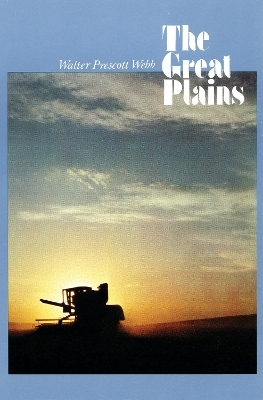
The Great Plains
Seiten
1981
University of Nebraska Press (Verlag)
978-0-8032-9702-9 (ISBN)
University of Nebraska Press (Verlag)
978-0-8032-9702-9 (ISBN)
- Titel erscheint in neuer Auflage
- Artikel merken
Zu diesem Artikel existiert eine Nachauflage
Arguing that the Great Plains environment of America constitutes a geographic unity whose influences have been so powerful as to put a characteristic mark upon everything that survives within its borders, this work singles out the revolver, barbed wire, and the windmill as evidence of a phase of civilization required for settlement of that region.
This classic description of the interaction between the vast central plains of America and the people who lived there has, since its first publication in 1931, been one of the most influential, widely known, and controversial works in western history. Arguing that "the Great Plains environment. . .constitutes a geographic unity whose influences have been so powerful as to put a characteristic mark upon everything that survives within its borders," Webb singles out the revolver, barbed wire, and the windmill as evidence of the new phase of civilization required for settlement of that arid, treeless region. Webb draws on history, anthropology, geography, demographics, climatology, and economics to substantiate his thesis that the 98th meridian constituted an institutional fault—comparable to a geological fault—at which "practically every institution that was carried across it was either broken and remade or else greatly altered."
This classic description of the interaction between the vast central plains of America and the people who lived there has, since its first publication in 1931, been one of the most influential, widely known, and controversial works in western history. Arguing that "the Great Plains environment. . .constitutes a geographic unity whose influences have been so powerful as to put a characteristic mark upon everything that survives within its borders," Webb singles out the revolver, barbed wire, and the windmill as evidence of the new phase of civilization required for settlement of that arid, treeless region. Webb draws on history, anthropology, geography, demographics, climatology, and economics to substantiate his thesis that the 98th meridian constituted an institutional fault—comparable to a geological fault—at which "practically every institution that was carried across it was either broken and remade or else greatly altered."
One of the unquestionably major historians of the American West, Walter Prescott Webb taught at London University, Oxford, and the University of Texas. He was the author of a number of highly provocative books, including The Great Frontier and this, his most famous study, The Great Plains.
| Erscheint lt. Verlag | 1.8.1981 |
|---|---|
| Zusatzinfo | Maps |
| Verlagsort | Lincoln |
| Sprache | englisch |
| Maße | 133 x 203 mm |
| Gewicht | 567 g |
| Themenwelt | Geschichte ► Teilgebiete der Geschichte ► Kulturgeschichte |
| ISBN-10 | 0-8032-9702-5 / 0803297025 |
| ISBN-13 | 978-0-8032-9702-9 / 9780803297029 |
| Zustand | Neuware |
| Haben Sie eine Frage zum Produkt? |
Mehr entdecken
aus dem Bereich
aus dem Bereich
der stille Abschied vom bäuerlichen Leben in Deutschland
Buch | Hardcover (2023)
C.H.Beck (Verlag)
23,00 €
vom Mittelalter bis zur Gegenwart
Buch | Softcover (2024)
C.H.Beck (Verlag)
12,00 €



